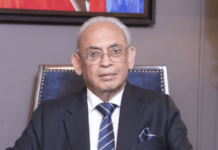Click http://bit.ly/komal444 if the above link does not auto play.
Tricolour Films, Varghese Moolan Pictures and 27th Entertainment’s Rocketry: The Nambi Effect (UA) is the story of ace aerospace engineer Nambi Narayanan who was falsely accused of espionage and arrested by the Kerala police.
Nambi Narayanan (R. Madhavan) is a brilliant aerospace engineer. He is hell-bent on bringing India on the world satellite map. He does not let the lack of resources available to the Indian team at the Indian Space Research Organisation (ISRO) come in the way of his dreams and does all he can to forge ahead in his mission. He is instrumental in developing the Vikas engine that would later be used for the first PSLV that India would launch. For Nambi, the country comes first — before even his family.
Nambi Narayanan gets a shock of his life when one day, he is arrested by the Kerala police out of the blue and accused of espionage. His family is ridiculed and faces social boycott. How Nambi fights back and is finally pronounced not guilty by the Supreme Court forms the crux of the drama. The apex court even orders the Kerala government to pay him compensation of Rs. 50 lakh within eight weeks. The government of Kerala, however, decides to give him Rs. 1.30 crore by way of compensation but even four years later, Narayanan is yet to get a major part of the compensation.
R. Madhavan, Anjali Nair, Ananth Narayan Mahadevan and Sreedevi Krishnan have written a story which touches the heart but it is so sketchy and so technical that the impact gets diluted. R. Madhavan’s screenplay and Sukhmani Sadhana and Anjali Nair’s additional screenplay are long-drawn and often miss out on the most dramatic moments. For instance, the news of Nambi Narayanan’s acquittal by the Supreme Court is conveyed to the audience through a dialogue (by Nambi to his wife after a telephonic conversation with the person breaking the news to Nambi, presumably from Delhi) that all is over. After the physical and mental torture, the viewers would’ve loved to see the person breaking the news as well as Nambi’s reaction while it is being conveyed to him. Even if it were to be a cinematic liberty, it had to be taken. Without that, the screenplay becomes too class-appealing as the masses want everything underlined, explained and recreated. Even otherwise, the screenplay relies so heavily on the technical aspects of aerospace engineering that it would put off the masses, especially in the pre-interval portion. The human drama after interval is far more appealing than the technical verbosity of the first half but the sketchiness of the drama reduces even its impact. For example, the identity of the person/persons responsible for Nambi’s arrest and torture is not spelt out beyond doubt. This does not give the viewers specific people to hate or loathe. Even the emotions in the human drama are subdued. The screenplay could’ve underlined the elements of patriotism and emotions but they remain so under-pronounced that the drama becomes very class-appealing. This is not to say that there aren’t any emotional scenes. The scene in which Unni (Sam Mohan) meets Nambi in jail evokes emotions and so do the scenes of Nambi’s torture and the one in which he gets the news of his acquittal (but the emotions are underplayed to disadvantage). The scene in which the interviewer (Shah Rukh Khan) goes down on his knees is also sentimental. The intensity of the emotions in the family scenes post-interval is far lesser than what it should’ve been.
Dialogues, penned by R. Madhavan, with additional dialogues by Rahul Pandey (Hindi) and Anjali Nair (English), are very good.
R. Madhavan does well in the role of Nambi Narayanan. He is cute in light scenes and quite effective in the others. Simran acts quite nicely as Meena. Sam Mohan delivers a heartwarming performance as Unni. Shah Rukh Khan is extraordinary as Shah Rukh Khan, the star interviewer. Full marks to his genius in understanding the character and for being just what an interviewer ought to be — a catalyst, yet a person with a strong individuality and identity to match the interviewee. Muralidharan is good in the role of Arunan. Meesha Ghosal is natural as Geeta. Shyam Renganathan lends fair support as Shankar. Sriram Parthasarathy stands his own as Barry Amaldev. Rajeev Ravindranathan is lovely as Param. Bhawsheel Sahani Singh has his moments as Sartaj. Venkataraghavan Srinivasan leaves a mark as the CBI officer. Rajit Kapur is good in the role of Vikram Sarabhai. Amaan (as APJ Abdul Kalam), Vincent Riotta (as Prof. Crocco), Deepak Kriplani (as Satish Dhavan), Ron Donachie (as Cleaver Hughes), Phyllis Logan (as Mrs. Cleaver Hughes), Anurita Jha (as Mariam Rasheeda), Vladimir Vuckovic (as Yuri), Ema Gojkovic (as Elizabeth), Rick Zingale (as Prof. Chokmark), Dinesh Prabhakar (as L.D. Gopal) and the rest provide decent support.
R. Madhavan’s direction is quite nice. However, he has not been able to play up the emotional and patriotic quotients of the film. Music (Billy Christopher Dawson, Nate Cornell and Divakar Subramaniam) is ordinary; none of the songs has the hummable quality about it. Lyrics are okay. Sam C.S.’s background music is fairly nice. Sirsha Ray’s camerawork is excellent. Nishant Khan’s action scenes are quite realistic. Ranjit-Prerna’s production designing, and Nilesh Vishwakarma’s art direction are of a good standard. Bijith Bala’s editing ought to have been tighter.
On the whole, Rocketry: The Nambi Effect is a film with good intentions but it is very class-appealing. It has little for the masses as its technical jargon will make it difficult for them to understand and enjoy the drama. Having said that, it must be added that the film will win a lot of critical acclaim.
Released on 1-7-’22 at Inox (daily 3 shows) and other cinemas of Bombay thru UFO Cine Media Network. Publicity: dull. Opening: poor. …….Also released all over. Opening was very weak everywhere.





























